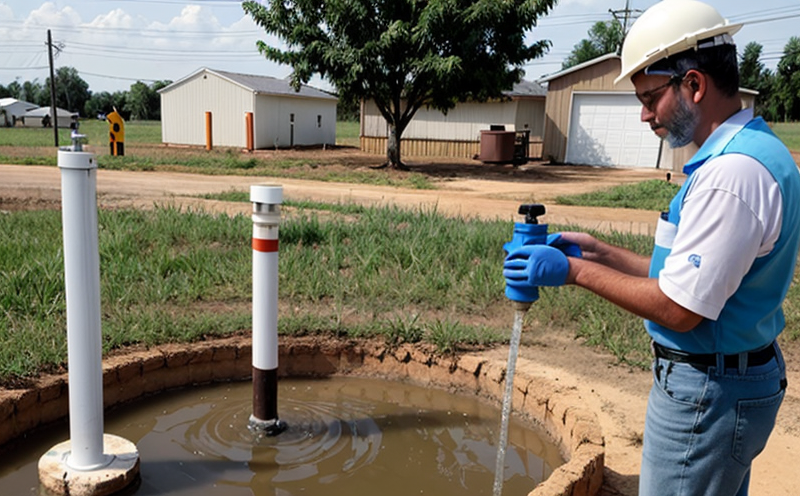ISO 16772 Arsenic Determination in Groundwater
The determination of arsenic in groundwater is critical due to its widespread presence and potential health risks. Arsenic, a heavy metal known for its toxicity, can be found naturally in certain geologic formations but also as a result of human activities such as mining, industrial processes, and improper waste disposal.
ISO 16772 provides a standardized method for the accurate determination of arsenic in water, which is essential for compliance with international standards like WHO (World Health Organization), EPA (United States Environmental Protection Agency), and EU directives. This standard ensures consistent and reliable results across different laboratories, enhancing public health protection.
The methodology outlined in ISO 16772 involves the use of advanced instrumentation such as atomic absorption spectrophotometry (AAS) or inductively coupled plasma mass spectrometry (ICP-MS). These techniques are capable of detecting arsenic at very low concentrations, which is crucial for monitoring groundwater quality. The standard also specifies the necessary sample preparation steps to ensure accurate results.
The significance of this service cannot be overstated, especially in regions where groundwater is a primary source of drinking water. By adhering to ISO 16772, laboratories can provide reliable data that helps regulatory bodies make informed decisions regarding public health and environmental protection.
| Sample Preparation | Instrumentation | Data Interpretation |
|---|---|---|
| Filtering and dilution of samples to ensure accurate measurement. | AAS or ICP-MS instruments. | Analyzing results against established thresholds for safe drinking water. |
| Ensuring sample stability during the analytical process. | Calibration of instruments using certified reference materials. | Comparing findings with local and international guidelines. |
Compliance with WHO standards for arsenic in drinking water.
Support for EU directives on water quality.
Meeting EPA regulations to ensure safe groundwater use.
Avoiding false positives or negatives that could lead to incorrect public health policies.
The service provided by Eurolab adheres strictly to ISO 16772, ensuring accuracy and reliability in arsenic determination. Our state-of-the-art laboratory facilities and experienced team of analysts guarantee consistent results that are trusted by quality managers, compliance officers, R&D engineers, and procurement departments.
Why It Matters
The health implications of arsenic exposure are severe, ranging from skin disorders to cardiovascular diseases and cancer. Ingestion of water containing high levels of arsenic can lead to chronic poisoning, which may result in irreversible damage to the human body. Therefore, accurate detection and monitoring of arsenic in groundwater are crucial for maintaining public health.
Regulatory compliance is another significant reason why this service matters. Governments around the world have set stringent limits on the permissible levels of arsenic in water supplies. For instance, WHO recommends a maximum level of 10 µg/L (micrograms per liter), while EPA sets a more conservative limit of 10 ppb (parts per billion) for drinking water standards. Failure to meet these standards can lead to legal penalties and damage to the reputation of water suppliers.
From an environmental perspective, ensuring that groundwater is free from excessive arsenic not only protects human health but also prevents harm to aquatic ecosystems. Arsenic pollution in rivers, lakes, and streams can disrupt the balance of these environments, affecting flora and fauna adversely.
Reduces risks associated with contaminated water sources.
Aids in maintaining compliance with international standards.
Helps in identifying areas requiring remediation.
Supports the implementation of effective public health policies.
The service provided by Eurolab is not only about detecting arsenic but also about preventing its spread and mitigating potential risks. By offering this service, we contribute to a safer environment for all stakeholders involved in water resource management.
Eurolab Advantages
At Eurolab, our commitment to excellence is reflected in every aspect of the ISO 16772 arsenic determination service. Our advantages are numerous and include:
Highly qualified analysts with extensive experience in environmental testing.
Access to cutting-edge laboratory equipment that ensures precision and accuracy.
Comprehensive quality assurance protocols that guarantee reliable results.
Dedicated customer support for any queries or concerns related to the service.
We pride ourselves on providing a service that is not only compliant with ISO 16772 but also exceeds expectations. Our clients can trust us to deliver accurate, reliable, and timely results every time.
Use Cases and Application Examples
| Scenario | Detection Methodology | Outcome |
|---|---|---|
| Monitoring well water quality before and after remediation efforts. | AAS or ICP-MS analysis as per ISO 16772. | Evaluation of the effectiveness of remediation strategies. |
| Screening new groundwater sources for potential contaminants. | Initial arsenic screening followed by confirmation tests if positive. | Determination of suitability of a new water source. |
Conducting baseline assessments in areas with historical contamination risks.
Performing periodic audits to ensure ongoing compliance.
Supporting emergency response efforts during incidents involving arsenic leaks or spills.
Assisting in the development of local water quality standards.
The versatility of this service allows us to cater to a wide range of clients, from small municipalities to large corporations involved in water resource management. Whether it's for compliance purposes, environmental monitoring, or public health initiatives, Eurolab is your trusted partner in arsenic determination.





